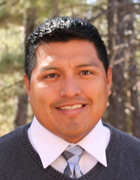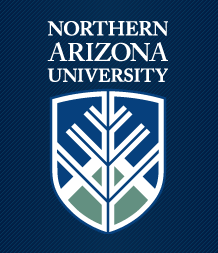
Armondo Escalanti
Armondo Escalanti, Alejandro Estrella-Lopez and Priscilla Rivera were among the dozens of graduating seniors who recently received golden honors during a reception where they were recognized for their contributions to Northern Arizona University, the university reported in a media release.
Twenty-two students received the university’s coveted Gold Axe Award for their achievements. Two of the winners — Shannon McClain and Haley Shukert — also received the prestigious President’s Prize for their exemplary leadership, academic excellence and service to the NAU community.
Escalanti is a criminology and criminal justice major in the College of Social and Behavioral Sciences. Estrella-Lopez is an instrumental music education and performance major in the Honors Program at the Tom Sheeley School of Music. Rivera is a biomedical science and chemistry major in the Brittany Johnson Housing and Residence Life program.

Alejandro Estrella-Lopez
The awards were announced at the Gold Axe and Distinguished Seniors awards banquet in Ashurst Auditorium.
The tradition of the Gold Axe Award dates back to 1933, a year after the student body adopted the axe as the symbol for Lumberjack athletics. It was then that NAU adopted the tradition of awarding small gold axe pins to outstanding members of the student body.
To this day, the gold axe pin is considered the official emblem of the Associated Students of NAU and is presented each semester to recognize students’ outstanding achievements and distinguished service to the university and the greater community.

Priscilla Rivera
Students selected for a Gold Axe Award also are eligible for the President’s Prize, considered the highest student recognition from the university. After reviewing all the Gold Axe nominations, a university-wide committee makes its recommendations to President Rita Cheng, who then selects the President’s Prize winners.
Visit http://news.nau.edu/exemplary-seniors-shine-awards-ceremony/#.VGZISUu4n8s to see a full listing of the honored students.
The Coconino County Community Development Department is seeking public feedback on proposed changes to sign and lighting codes as it updates the county’s zoning ordinances.
 “The county’s zoning ordinances haven’t received a comprehensive update since 1981, although many amendments have been made in that time,” Mandy Metzger, Board of Supervisors chair, stated in a media release. “By updating our zoning ordinances, we hope to make codes more user-friendly, while utilizing new tools to implement the goals and policies of the Comprehensive Plan. This will also streamline the permitting process by setting more performance standards, reducing the need for many projects to go to public hearing.”
“The county’s zoning ordinances haven’t received a comprehensive update since 1981, although many amendments have been made in that time,” Mandy Metzger, Board of Supervisors chair, stated in a media release. “By updating our zoning ordinances, we hope to make codes more user-friendly, while utilizing new tools to implement the goals and policies of the Comprehensive Plan. This will also streamline the permitting process by setting more performance standards, reducing the need for many projects to go to public hearing.”
A draft of proposed changes to the sign and lighting sections of the zoning ordinance are available for public input on the Community Development website at www.coconino.az.gov/CommunityDevelopment. These are the first sections of the zoning ordinance to undergo substantive changes as a part of a comprehensive rewrite of the code.
The entire project is expected to take about 16 months to complete, while using an advisory group of stakeholders to help review and guide proposed changes.
“A critical component to the success to this project is the involvement and participation of our community partners and the public,” said Jay Christelman, community development director. “It is important that these proposed changes match the sentiments of the rest of our customers and residents.”
Proposed changes to the lighting code include the expansion of restrictive lighting zones to protect dark skies and the elimination of unshielded lighting fixtures. The sign code has many changes including more permissive temporary event signage, the allowance for ranch arch entrance signs and a decrease in the size allowance for commercial and industrial space leasing signs.
The public is invited to visit the Community Development website at www.coconino.az.gov/CommunityDevelopment for more information on proposed changes to the ordinance, updates on progress and drafts of the sections.

Lecturer Mark Montoya advocates for first generation students at Northern Arizona University. Courtesy-photo
T. Mark Montoya was recently profiled by Northern Arizona University for his work in helping first-generation students attend college.
As the first person in his family to go to college, Montoya — an Ethnic Studies lecturer at Northern Arizona University as well as an alumnus — knows the challenges of navigating university life, the university reported in the profile.
His passion is guiding these types of students to success.
“Doing the work I do with first-generation students like myself, I want them to really understand that they’re not alone,” he says. “It’s very personal for me.”
Montoya’s efforts to support those students earned him an Outstanding Advocate Award from the university.
In addition, he has been the keynote faculty speaker at new student orientation for three years running. His goal is to give new students — and their parents — insight into higher education. And he also serves as a resource if they need guidance.
“They still have to ask for help, they still have to ask questions. If I’m not the person who can answer the question, I can at least be the person who can find somebody who can answer that question.”
Montoya’s message is an important one at NAU, the university reported. Almost 50 percent of the students at the university are the first in their families to go to college. At freshman orientation, where students and their families take time to explore the campus and begin the transition into college life, he serves as living proof that first-generation students can accomplish their dreams.
“I want to let them know that there’s at least one person who — while he seemingly might have it together — still asks for help and is still part of this process as well,” he says. “One of the things I also say is that I’ve been asked to do this talk to inspire you, but I don’t need to inspire you. It is people like you who are inspiring me every day.”
Montoya also draws inspiration from other campus work. He serves as a faculty adviser for several multicultural groups and teaches Ethnic Studies courses. And he works for the Successful Transition and Academic Readiness (STAR) program, which brings incoming freshman to the university the summer before their first semester and allows them to experience college classes — and life — while being supported by professors and staff. Despite the variety of activities he’s engaged in, Montoya says all of his endeavors are part of “one big project” to give students the chance to thrive.
“My favorite part of being a teacher is seeing people succeed, seeing them graduate, and getting emails or a Facebook message from a student who personally thanks me for something,” Montoya says. “It’s those little things that I think matter and it’s those personal connections that really make a big difference.”
The Coconino Community College District Governing Board will meet from 4 to 6 p.m. Thursday, Nov. 18 at the CCC Lone Tree Campus Boardroom, 2800 S, Lone Tree Road, Flagstaff. Visit http://www.coconino.edu/district-governing-board for more information.
 Northern Arizona University has been named a “Best College” for military vets and a top college for Native Americans.
Northern Arizona University has been named a “Best College” for military vets and a top college for Native Americans.
NAU ranked 27th in the nation, up nine spots from last year, in the Military Times “Best for Vets: College 2015” rankings.
“This is considered a coveted list that our service members will trust and refer to when considering a school of higher learning,” said Andrew Griffin, director of NAU’s Office of Military and Veterans Affairs. “NAU is a major contributor to Arizona’s veteran success, and I sincerely thank the university for its superb support to our veterans.”
This is the third “Best for Vets” recognition NAU has received from Military Times. In March, NAU’s W.A. Franke College of Business was named one of the nation’s top business schools for veterans. Last November, NAU ranked 36th in the 2014 “Best for Vets” list.
The Times’ editorially independent news project evaluated many factors that make an institution a good fit for military veterans, including a first-time focus on Education Department statistics commonly used to track student success and academic quality. Broadly speaking, schools were evaluated in five categories: university culture, student support, academic quality, academic policies and financial aid.
The complete Best for Vets rankings are online at http://projects.militarytimes.com/jobs/best-for-vets/2015/colleges/4-year/
The university was also named one of the country’s top educational options for Native Americans, as reported in the American Indian Science and Engineering Society’s 2014-15 College Guide.
In its annual list of the nation’s top 200 schools, published last month in Winds of Change, the society looked for colleges “where American Indians are going in significant numbers and where the community, Native programs and support are strong enough for these students to enjoy college and stay on to graduation.”
NAU was recognized among the best based on Native student enrollment and for having strong programs, support and community in place for students.
“Inclusion on this list reaffirms to the public that Northern Arizona University provides the academic support and a campus culture that fosters the success of its Native American students,” said Joseph Martin, special adviser to the president on Native American Affairs.
This year the list also included data measuring undergraduate degrees in science, engineering, technology and mathematics-related disciplines for all students and for American Indians and for the six-year graduation rates of all students and for American Indians.
